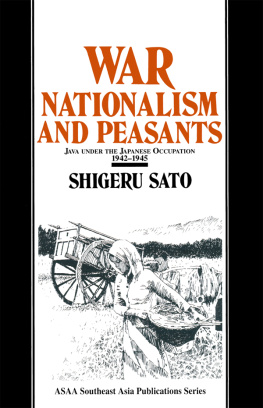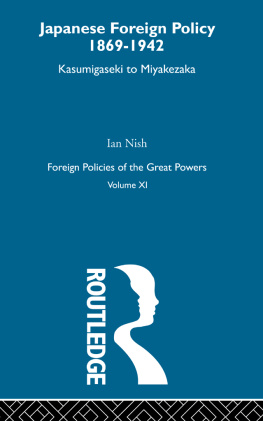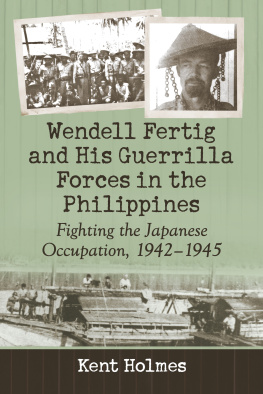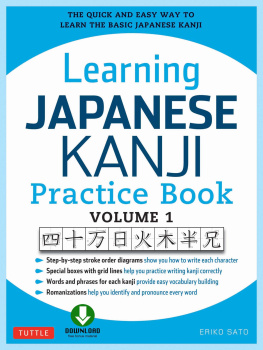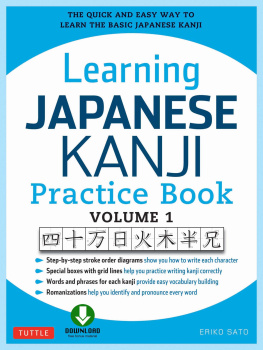First published 1994 by M.E. Sharpe
Published 2015 by Routledge
2 Park Square, Milton Park, Abingdon, Oxon OX14 4RN
711 Third Avenue, New York, NY 10017, USA
Routledge is an imprint of the Taylor & Francis Group, an informa business
Copyright 1994 by Shigeru Sato. All rights reserved.
No part of this book may be reprinted or reproduced or utilised in any form or by any electronic, mechanical, or other means, now known or hereafter invented, including photocopying and recording, or in any information storage or retrieval system, without permission in writing from the publishers.
Notices
No responsibility is assumed by the publisher for any injury and/or damage to persons or property as a matter of products liability, negligence or otherwise, or from any use of operation of any methods, products, instructions or ideas contained in the material herein.
Practitioners and researchers must always rely on their own experience and knowledge in evaluating and using any information, methods, compounds, or experiments described herein. In using such information or methods they should be mindful of their own safety and the safety of others, including parties for whom they have a professional responsibility.
Product or corporate names may be trademarks or registered trademarks, and are used only for identification and explanation without intent to infringe.
First published in 1994 by Allen & Unwin in association with the Asian Studies Association of Australia
Library of Congress Cataloging-in-publication data:
Sait, Shigeru, 1950- .
War, nationalism, and peasants: Java under the Japanese
occupation, 19421945 / Shigeru Sato,
p. cm.
An East Gate book.
Includes bibliographical references.
ISBN 1-56324-544-2.ISBN 1-56324-545-0 (pbk.)
1. Java (Indonesia)History. 2. IndonesiaHistoryJapanese occupation, 1942-1945. 3. NationalismIndonesiaJava.
4. PeasantryIndonesiaJava. I. Title.
DS646.27.S35 1994
ISBN 13: 9781563245459 (pbk)
ISBN 13: 9781563245442 (hbk)
During the Second World War the Japanese military occupied most parts of the Netherlands Indies. If history has watersheds, this period certainly constitutes a major one in Indonesian history. Historians have pointed out that the Japanese occupation brought about many important political changes: it removed the Dutch colonial authorities; the Indonesian nationalists consolidated their political leadership; the Japanese promised to grant independence to Indonesia and its preparation was almost completed by the end of the occupation; the indigenous defence forces were created; the consolidation of Islamic groups progressed to a significant extent; and groups of politicised youths emerged. These factors made positive contributions to achieving independence and shaping political developments thereafter. Making a sharp contrast, however, the occupation caused severe suffering and misery to the mass of the people in Java. Brutal oppression by the Kenpeitai (Japanese military police), coercive recruitment and maltreatment of romusha (labourers), and the forced delivery of rice to the military administration were among the most notorious events. The abrupt curtailment of international and inter-island trade also caused shortages of certain commodities such as textiles, which became so severe that a considerable proportion of the people had to live in rags or even stark naked.
The existing literature presents these two aspects as if they constituted two separate issues. Historians have scrutinised the political events primarily because of the significance for the following era, while they have paid relatively little attention to the humanitarian issues which directly affected those who had to live and die during that particular period. When attempts were made to bridge the two aspects, they were usually done by questioning who were collaborators of the brutal regime (Sukarno?) and who strived for the political goal in defiance of the Japanese (Syahrir?). Alternatively who were oppressive imperialists (Kenpeitai?) and who were sympathetic towards the independence of Indonesia (Maeda?). Initially I hoped to integrate the two aspects more tightly with a view to obtaining a holistic understanding of social dynamics, what the occupation and politics meant for the majority of the people and how their experience and behaviour contributed to the shaping of social and political changes in the following era. For this purpose I planned to conduct interviews in rural Java in order to investigate how the occupation altered the social order and economic situation in Javanese villages and how it affected villagers political consciousness and behaviour, which were in their turn conducive to the social and political upheavals in the following era. In June and July 1986 I made a short preliminary visit to Java, during which I had an opportunity to meet a retired Indonesian government official, Sarimin Reksodiharjo. At his residence in a quiet suburb of Purwokerto, Central Java, he related his personal experience as follows:
In the 1930s he was a great fan of cheap Japanese goods and invariably friendly Japanese traders. He always had his hair cut by a Japanese barber. In 1941 most Japanese traders were repatriated and the following year Japanese soldiers came. The three and half years of Japanese occupation were a nightmare. The Japanese forced farmers to surrender enormous amounts of rice, causing many deaths from starvation. The Japanese also forcibly mobilised many millions of people as romusha and sent them overseas. Many never returned. Sarimin could never understand why Japanese who were so gentle and friendly before the war could behave so cruelly during the war. However, all the Japanese individuals he was closely associated with, including the Kenpeitai chief in Pekalongan Residency, were pleasant and friendly and paid much attention to humanitarian issues. After the war, between 1951 and 1952, Sarimin went to Japan as an Indonesian delegate for the negotiation of war reparations. On this occasion he met his old Japanese associates. The Japanese received the Indonesian delegates warmly but Sarimin discovered during the negotiation that the Japanese did not have any sense of guilt over what they had done in Indonesia during the war and therefore had no intention of repairing the enormous damage they had inflicted on Indonesians. On this point, Sarimin again emphasised, with an inquisitive look at me, that he could never understand the Japanese.
The content of Sarimins talk was not new to me. I had read many similar accounts in books, articles and theses. Nevertheless, I could not give any satisfactory answer to Pak Sarimins question as to why the Japanese could be so cruel and not feel guilty about it. I had to promise him that I would find the answer through my research. Some time after my return from Java, the Indonesian authorities informed me that they had rejected my application to conduct interviews in Java. This rejection compelled me to modify my research plan to a considerable extent. Close investigation into village politics and so on was no longer possible. Therefore the thrust of my study came to focus on the impact of the occupation on the economic and physical welfare of the peasantry of Java relying primarily upon archives, personal collections, and libraries in Indonesia, Japan, the Netherlands, Australia, and the United States.
I soon discovered that there were many glaring contradictions in the existing accounts. For example, some writers have argued that the Japanese took 70 or 80 per cent of the total rice produced in Java. Evidently, however, the Japanese took no rice from Java to Japan during the war. The Japanese population in Java was usually less than 0.1 per cent of Javas population, and even the entire Japanese population in the whole of Southeast Asia and the Southwest Pacific war theatre never reached two per cent of it. Therefore a question arose: Why did the Japanese demand so much rice, and what did they do with it? Concerning the romusha issue, there are accounts that the labour mobilisation by the Japanese was so enormous that in many villages almost all able-bodied male workers were removed and thus substantial parts of rice fields were left unplanted. According to other studies, however, the number of romusha sent overseas from Java was probably half a million at most. The miserable plight of as many as half a million people was indeed a serious humanitarian issue but half a million was, statistically, no more than one per cent of the total population in Java. Removal of that proportion of the work force from the reputedly over-populated island could not have affected agriculture so drastically. What, in reality, had happened?

